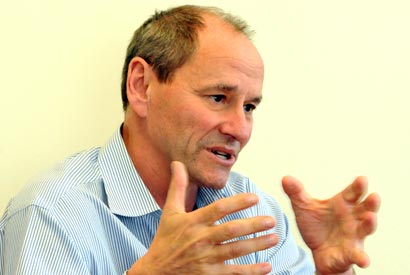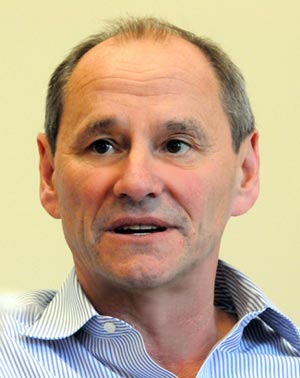New campus budget chief’s ax is a ’60s-era Fender Strat — but in 2011, he says, the wind cries ‘change’
John Wilton, an economist who spent two decades with the World Bank, views Berkeley and higher ed generally as vital to California's — and the nation's — future. But persuading the state to renew its investment in education and innovation, he says, may hinge on getting our own house in order.

February 8, 2011
Among John Wilton’s prized possessions is a classic ’60s-era Fender Stratocaster, the iconic electric guitar made famous by generations of rock gods and the very model, he notes, favored by Jimi Hendrix. “But I never play it anymore,” he laments, “and my musical skills are down to about five chords.”
Wilton, who began work last week as vice chancellor for administration and finance, doesn’t offer this as an object lesson; he’s simply a music lover and Hendrix fan. Just the same, purposefulness is a recurring riff as he reflects on his journey from London to Berkeley, and on how to steer the campus toward financial sustainability without sacrificing its place in the pantheon of public universities.

John Wilton, vice chancellor for administration and finance (Peg Skorpinski photo)
It’s a challenge he’s eager to tackle, even if he did take a few detours on his way here.
A product of British state schools, Wilton went on to earn his bachelor’s and master’s degrees at Sussex University — where he played volleyball for the national team — headed to Africa for a two-year stint as an economist for the government of Tanzania, then returned to England to study for his Ph.D. at Cambridge University on a scholarship. He was soon selected for a coveted spot in the World Bank’s “Young Professionals” program — with assignments in Zambia and Indonesia — and offered a full-time job with the bank while still in his first, probationary year.
“I always thought I’d go to the World Bank for two or three years, learn more about the bank and what it did, and then come back and finish my doctorate,” he laughs. “Twenty-three years later I was still there.”
Over his two decades with the bank, Wilton lived and worked in locales ranging from Indonesia and Bulgaria to Washington, D.C., headquarters, where he rose to vice president of strategy and finance. He left the bank in 2006 to become a managing director of Farallon Capital Management, a global hedge fund, and since 2008 has also served as macroeconomics adviser to Hellman and Friedman, a San Francisco-based private-equity fund with offices in New York and London.
He now lives in Marin County with his wife, a Connecticut native, and high-school-age daughter. His son is a recent college graduate.
Still settling into his new digs in California Hall, Wilton, animated and relaxed in an open-necked pinstripe shirt, admits his optimism for the campus’s future is tempered by “exogenous challenges,” particularly the massively overburdened state budget. But if Berkeley is to retain its role as the nation’s leading public university, he insists it’s crucial that the state of California keep its eye on the prize — even in the thick of a fiscal crisis.
“While it’s true that the state has to balance its budget — and I can understand the difficult dilemma that policymakers face in California — that doesn’t make it sensible to cut the most important investment this state makes, which is its education system,” Wilton says. “That doesn’t solve the problem.”
“If you imagine that you’re traveling along a road and you come to valley, and you want to get to the other side, it makes much more sense to build a bridge across than go down the valley and then come up the other side,” he adds. “So if our objective is having a great research and education system, and we already have one, why would we underfund it and cause it to go into decline, only to reinvest and rebuild it later? Wouldn’t it be more sensible to support it until it’s on a more sustainable path?”
As a macroeconomist, says Wilton, “I start off with the big picture, and go from there to the smaller picture.” The big picture, as he sees it, is the global economy, which is more integrated and more competitive than ever before.
“If the U.S. is going to compete, it has to have a trained, highly skilled labor force, and it has to be innovative,” he says. “So I start from that picture, and then I ask, Well, within the United States, what is the public institution that best provides the skills that people need in order to have good jobs and fulfilling lives?”
His answer? UC Berkeley.
“Obama, in his State of the Union address, said the U.S. should focus on making investments in three priority areas: innovation, education and infrastructure,” he says. “Berkeley does two of those better than any other public university: We foster innovation through our research, and we provide outstanding undergraduate and postgraduate education.
“If we’re leading the way in two out of three U.S. goals, it makes no sense not to invest in them. It’s nonsense to think that you’re going to generate jobs and economic growth if you can’t innovate, and if you don’t have an educated workforce.”
Squaring the circle
But the logic of macroeconomics alone, Wilton knows, won’t alter the funding priorities of officials in Sacramento. Change, he believes, starts at home. And as Berkeley’s chief administrative officer — managing a campus budget of $1.8 billion and overseeing some 2,400 employees — he’s already grappling with what it will take to get Berkeley’s financial house in order.
“There are two sides to it,” he says. “Berkeley has to be more efficient and it has to be put on a sustainable financial footing. At the same time, it has to be adequately funded to achieve that objective.
“Squaring that circle,” he adds, “is the challenge.”
Operational Excellence, the campuswide effort to improve administrative operations and find and implement $75 million in annual administrative-cost savings, is “absolutely key,” he believes, “for both economic and political reasons.”
Beyond the inherent need to streamline operations — witness the past two years of layoffs, furloughs, hiring freezes, tuition hikes and the rest of the fallout from slashes in state funding — Wilton views OE as a critical tool in making the case for higher ed: “I think it’s an important message to the people who fund you, that they’re not wasting taxpayers’ money.”
And notwithstanding the jokes about a resemblance between the university’s struggles and those of many World Bank clients in the developing world, he does find some of the dynamics familiar.
“The big challenge at the bank, and at a place like Berkeley, is that you have a lot of important things people want to do, and they all could potentially make a real difference in people’s lives,” he says. “But we live in a world of finite resources. So we have to marry the resources with the priorities, and make that part of a coherent strategy that people accept.”
For years, he says, the World Bank faced criticism for its policies from both the left and right, and confusion over its operations from its own employees. On both fronts, he says, improving transparency helped smooth the waters. Once-hostile activists now have representatives “inside the building,” resulting in dialogue, Wilton says, that is “better informed, and has channeled the significant energy of NGOs toward finding solutions, rather than trying to find someone to blame.” Internally, Wilton himself launched a series of “town hall” lectures in which he explained the inner workings of the bank to interested staff.
“We found a lot of people were much happier once they understood what the whole picture looked like, rather than just their little bit,” he says.
The lesson? “You’ve got to reach out and talk to people,” he declares, a philosophy he vows to implement here at Berkeley.
Adapt or die
Moving from high finance to higher education is, for Wilton, a logical next step.
“I’m a product of the state education system, and benefited tremendously from it. So this is a great opportunity for me to try to give some of that back. But more importantly, I just think it’s absolutely essential to provide people with the opportunity to realize their potential,” he explains.
As for Berkeley, continuing to realize its potential — retaining its excellence and public character while moving to long-term sustainability — will mean a serious commitment to change, Wilton says.
“This is not peculiar to Berkeley,” he adds. “Every institution, every business, everybody has to adapt. If you don’t adapt, you die.
“The way I think of it is, you can either do it willingly, and be in charge of the process, or you can do it unwillingly and in crisis, and not be in charge of it. Doing it the latter way is not desirable, because you end up being pushed into doing things you don’t want to do.”
In the end, he believes, it comes down to purposefulness. And from what he’s seen thus far, he thinks Berkeley is committed to doing what needs to be done.
“Migrating to a sustainable model will be more difficult because of the overarching budget environment we find ourselves in,” he acknowledges. “But that’s life. While we will resist unfair cuts, we have to focus on what’s within our control, and be proactive in searching for solutions.
“Berkeley has more than its fair share of smart, dedicated people who are equipped to meet the challenge it confronts,” he says. “Many of the people I’ve met here know where they want to go. They fully accept the need for change. And I look forward to working with them to flesh out the road map and get it done.
“We have to accept that we’ll make some mistakes,” he says. “But we must be prepared to own up to our mistakes and make corrections, as well as engage in constructive debate.
“The biggest mistake,” he adds, “would be to be frozen into inaction simply because we don’t know everything.”